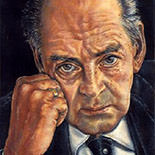 Vladimir Vladimirovich Nabokov, also known by the pen name Vladimir Sirin; April 22, 1899 – July 2, 1977) was a Russian-American novelist.
Vladimir Vladimirovich Nabokov, also known by the pen name Vladimir Sirin; April 22, 1899 – July 2, 1977) was a Russian-American novelist.
Nabokov’s first nine novels were in Russian. He then rose to international prominence as a writer of English prose. He also made serious contributions as a lepidopterist and chess composer.
Nabokov’s Lolita (1955) is his most famous novel, and often considered his finest work in English. It exhibits the love of intricate word play and synesthetic detail that characterized all his works. The novel was ranked fourth in the list of the Modern Library 100 Best Novels; Pale Fire (1962) was ranked at 53rd on the same list, and his memoir, Speak, Memory, was listed eighth on the Modern Library nonfiction list. He was a finalist for the National Book Award for Fiction seven times, but never won it.
Nabokov’s childhood, which he had called “perfect”, was remarkable in several ways. The family spoke Russian, English, and French in their household, and Nabokov was trilingual from an early age. In fact, much to his patriotic father’s chagrin, Nabokov could read and write in English before he could in Russian. In Speak, Memory Nabokov recalls numerous details of his privileged childhood, and his ability to recall in vivid detail memories of his past was a boon to him during his permanent exile, and provided a theme that echoes from his first book Mary to later works such as Ada or Ardor: A Family Chronicle. While the family was nominally Orthodox, they felt no religious fervor, and Vladimir was not forced to attend church after he lost interest. In 1916, Nabokov inherited the estate Rozhdestveno, next to Vyra, from his uncle Vasiliy Ivanovich Rukavishnikov (“Uncle Ruka” in Speak, Memory), but lost it in the October Revolution one year later; this was the only house he ever owned.
The Nabokovs settled in Manhattan and Vladimir began volunteer work as an entomologist at the American Museum of Natural History.
Nabokov joined the staff of Wellesley College in 1941 as resident lecturer in comparative literature. The position, created specifically for him, provided an income and free time to write creatively and pursue his lepidoptery. Nabokov is remembered as the founder of Wellesley’s Russian Department. The Nabokovs resided in Wellesley, Massachusetts, during the 1941–42 academic year. In September 1942 they moved to Cambridge where they lived until June 1948. Following a lecture tour through the United States, Nabokov returned to Wellesley for the 1944–45 academic year as a lecturer in Russian. In 1945, he became a naturalised citizen of the United States. He served through the 1947–48 term as Wellesley’s one-man Russian Department, offering courses in Russian language and literature. His classes were popular, due as much to his unique teaching style as to the wartime interest in all things Russian. At the same time he was the de facto curator of lepidoptery at Harvard University’s Museum of Comparative Zoology.After being encouraged by Morris Bishop, Nabokov left Wellesley in 1948 to teach Russian and European literature at Cornell University, where he taught until 1959. Among his students at Cornell was future U.S. Supreme Court Justice Ruth Bader Ginsburg, who later identified Nabokov as a major influence on her development as a writer.
Nabokov wrote Lolita while traveling on butterfly-collection trips in the western United States that he undertook every summer. Véra acted as “secretary, typist, editor, proofreader, translator and bibliographer; his agent, business manager, legal counsel and chauffeur; his research assistant, teaching assistant and professorial understudy”; when Nabokov attempted to burn unfinished drafts of Lolita, it was Véra who stopped him. He called her the best-humored woman he had ever known.
In June 1953 Nabokov and his family went to Ashland, Oregon. There he finished Lolita and began writing the novel Pnin. He roamed the nearby mountains looking for butterflies, and wrote a poem called Lines Written in Oregon. On 1 October 1953, he and his family returned to Ithaca, New York, where he would later teach the young writer Thomas Pynchon.
THE ENCOUNTER
Vladimir Nabokov
enchanted by this strange proximity
Longing, and mystery, and delight…
as if from the swaying blackness
of some slow-motion masquerade
onto the dim bridge you came.
And night flowed, and silent there floated
into its satin streams
that black mask’s wolf-like profile
and those tender lips of yours.
And under the chestnuts, along the canal
you passed, luring me askance.
What did my heart discern in you,
how did you move me so?
In your momentary tenderness,
or in the changing contour of your shoulders,
did I experience a dim sketch
of other — irrevocable — encounters?
Perhaps romantic pity
led you to understand
what had set trembling that arrow
now piercing through my verse?
I know nothing. Strangely
the verse vibrates, and in it, an arrow…
Perhaps you, still nameless, were
the genuine, the awaited one?
But sorrow not yet quite cried out
perturbed our starry hour.
Into the night returned the double fissure
of your eyes, eyes not yet illumed.
For long? For ever? Far off
I wander, and strain to hear
the movement of the stars above our encounter
and what if you are to be my fate…
Longing, and mystery, and delight,
and like a distant supplication….
My heart must travel on.
But if you are to be my fate…